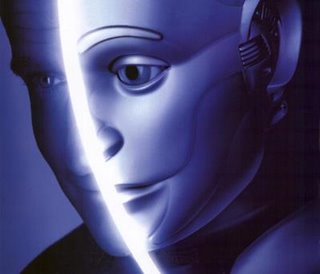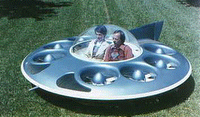 I guess it was inevitable; after watching both Pixar’s “Cars” and 20th Century Fox’s “Robots” I started thinking about the coming technological singularity and humanity’s upgrade to ‘post human’.
I guess it was inevitable; after watching both Pixar’s “Cars” and 20th Century Fox’s “Robots” I started thinking about the coming technological singularity and humanity’s upgrade to ‘post human’.Transhumanism is one of those concepts that are almost pseudoscience – what Michael Shermer might call ‘borderland science’. It is based upon the idea of using technology to augment a human, an idea that is as old as Mary Shelley’s writings – and just as scary as Frankenstein’s monster.
Science fiction writer Vernor Vinge wrote about an, “intelligence explosion” which would happen when artificial intelligence technology got to the point where the AI could start designing its own upgrades. At that point AIs would become more intelligent in a sort of uncontrolled feedback loop explosion. Vinge called this point “the Singularity.”
MIT educated engineer and inventor Raymond Kurzweil wrote an essay in 2001 called, “The Law of Accelerating Returns” in which he projects a timeline based somewhat on Moore’s Law and looks at its implications. Moore’s Law is not really a law, more of an observation that about once every 18 months (give or take 6 months) computing power doubles. Scientists wonder if this rate is sustainable – especially after we get to the point where circuits are so small that the effects of Quantum Physics render current electronics theories useless. Kurzweil hypothesizes that new technology will be invented to take over when current technology reaches a fundamental limit – and perhaps he has something with this. Quantum computing may possibly take the place of electronics-based computing.
 The major implication of advancing toward a technological singularity, according to Kurzweil, is that it may be possible to become immortal. Kurzweil thinks of immortality as maintaining an augmented human body with nanobots, sort of like a Star Trek ‘Borg’, (but without the look of a robotic Dominatrix.)
The major implication of advancing toward a technological singularity, according to Kurzweil, is that it may be possible to become immortal. Kurzweil thinks of immortality as maintaining an augmented human body with nanobots, sort of like a Star Trek ‘Borg’, (but without the look of a robotic Dominatrix.)Author and ‘futurologist’ Ian Pearson also talks about the upcoming technological advances in Artificial Intelligence, and has gone so far as to suggest that our minds might be uploaded into a piece of hardware. He also talks about intelligent yogurt, but I’m not sure if it was of the strawberry and banana kind, or the plain vanilla type.
I’ve got a couple of problems with transitioning all of Humanity into better hardware. Some parts of a future upgrade are attractive, like the not ceasing to exist part, but other parts I worry about. Like the fact that many of our emotions have glandular components. Will we still shed tears when we grieve? And is it really love if you can’t feel your heart skip a beat? Samantha Bee asked Kurzweil if we will be able to have sex with robots; that question has already been answered affirmatively by the porn industry (batteries not included) – the real question is if we, as future robots, will have sex with each other? Perhaps the question will become moot upon the passing of biological urges.
I don’t believe that emotion will disappear – I just think that it could become divorced from its biological components – and in so doing it would become ‘alien’ to our current way of thinking.
I have a problem with ‘uploading your mind’ into a computer. The problem is that you are not uploading yourself, you are instead copying yourself. If I upload a floppy disk onto my hard drive, the software may run faster, but the original floppy disk doesn’t disappear. The floppy disk is then put away into a drawer, discarded, erased and re-used, or more likely these days it is seen as archaic and thrown away. As soon as you upload yourself into a computer, the flesh and blood ‘you’ becomes superfluous, ready for discard. This would be disconcerting, to say the least, to the ‘you’ that still inhabited the flesh and blood body about to be discarded!
This is where Kurzweil’s idea of nanorobotics becomes more attractive – instead of copying our intelligence into a computer; we could instead over a period of time upgrade our human bodies until they become a computer. This follows nature’s current method of replacing cells in a human body. Human bodies replace all of their cells several times over a lifetime, and the mind continues unbroken during these cell changes.
Perhaps there will come a time when the software of the Mind becomes complex enough to view its physical body at a different level, and instead see it as a sort of housing. If we reach this point we will then be able to transfer our intelligence to a new housing without the same qualms as uploading from our brains. Instead of ‘copied’ intelligences, we’ll become capable of ‘cut and paste’. (We can then store our previous body, or perhaps sell it on Ebay.)
I have a major problem with all of these predictions. The people talking about Transhumanism or ‘post humans’ are well educated, they are also Science Fiction authors, or work at predicting the future of technological trends. The singularity is forecast to happen between 2020 and 2075 – so it is possible that I may see it in my lifetime. Your kids, and certainly your grandkids will see it happen.
If it happens.
 Predictions of the future are notoriously unreliable. I’m the first to admit that current technology is pretty amazing – but I also have to lament that past predictions have not come true. Where are our hover cars? Why aren’t we living on the Moon or on Mars? “2001, A Space Odyssey” is already 5 years past-due, and we still haven’t achieved the technology that was installed in the spaceship Discovery One. During the Golden Age of Science Fiction stories were placed in the magical year of 2000, where we all owned our own space suits, and we vacationed on Venus.
Predictions of the future are notoriously unreliable. I’m the first to admit that current technology is pretty amazing – but I also have to lament that past predictions have not come true. Where are our hover cars? Why aren’t we living on the Moon or on Mars? “2001, A Space Odyssey” is already 5 years past-due, and we still haven’t achieved the technology that was installed in the spaceship Discovery One. During the Golden Age of Science Fiction stories were placed in the magical year of 2000, where we all owned our own space suits, and we vacationed on Venus.These predictions are merely this, predictions. Some predictions, like flying cars and personal space craft, are as yet still unworkable. Other predictions such as giant college-campus-sized computers didn’t turn out as we thought they would, miniaturization and quantities of scale have put supercomputers on everyone’s desktop. Other advances are so far out that they were not even written about in the Golden Age of Science Fiction – the Internet was a surprise.
Predicting the future is a hobby burdened with disappointments. Long-range forecasts are about as accurate as long-range weather forecasts, we can say with certainty that it WILL rain next year, but we can’t say for sure if the rain will ruin our 4th of July Barbeque. We can say for certain that there WILL be major advances in technology, but we can’t say for sure what this will imply for humans.
Perhaps technological immortality will become available for humans – and perhaps not. I think that it’s too early to say for sure. Perhaps we will become post-humans, and perhaps we will instead become slaves to, or extinct because of our cybernetic overlords. Right now it is all just a ‘borderland science’ and as such I won’t worry about it much.
Hmm… I think I’ll watch Bicentennial Man again, and I really wanted to catch up with what’s going on with brain-machine interfaces.

No comments:
Post a Comment